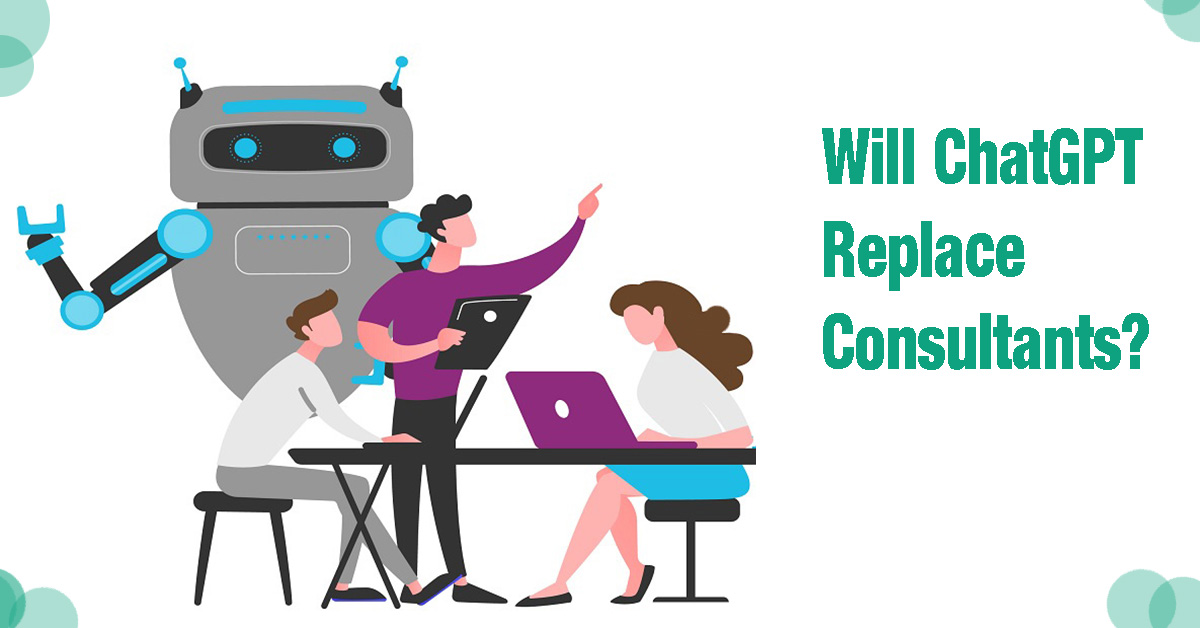
With the development of ChatGPT, an AI language model that can communicate and assist people in natural language, this question has become more prevalent. Have you ever wondered if ChatGPT will replace human consultants?
Although it seems like a far-off concept, it’s important to consider the potential implications of AI replacing human consultants.
Could ChatGPT provide more cost-effective and efficient consulting services for businesses? Or would the lack of human interaction and personalized expertise lead to a decline in the quality of consulting services?
Let’s delve deeper and see what the future may hold.
What Role Will ChatGPT Play in the Future of Consulting?
As ChatGPT continues to develop and improve, it’s normal for you to wonder what role it will play in the future of work. The consulting industry is one area where ChatGPT will have more applications and impacts. Here are some potential roles ChatGPT will play in the future of consulting:
Enhanced Efficiency and Cost-Effectiveness
Unlike human consultants who may be limited by their time and availability, ChatGPT can provide 24/7 assistance to clients, which means they can get immediate support whenever needed.
Additionally, ChatGPT can assist multiple clients simultaneously, allowing for a more streamlined and efficient consulting process. Here’s what ChatGPT enhances the efficiency and cost-effectiveness:
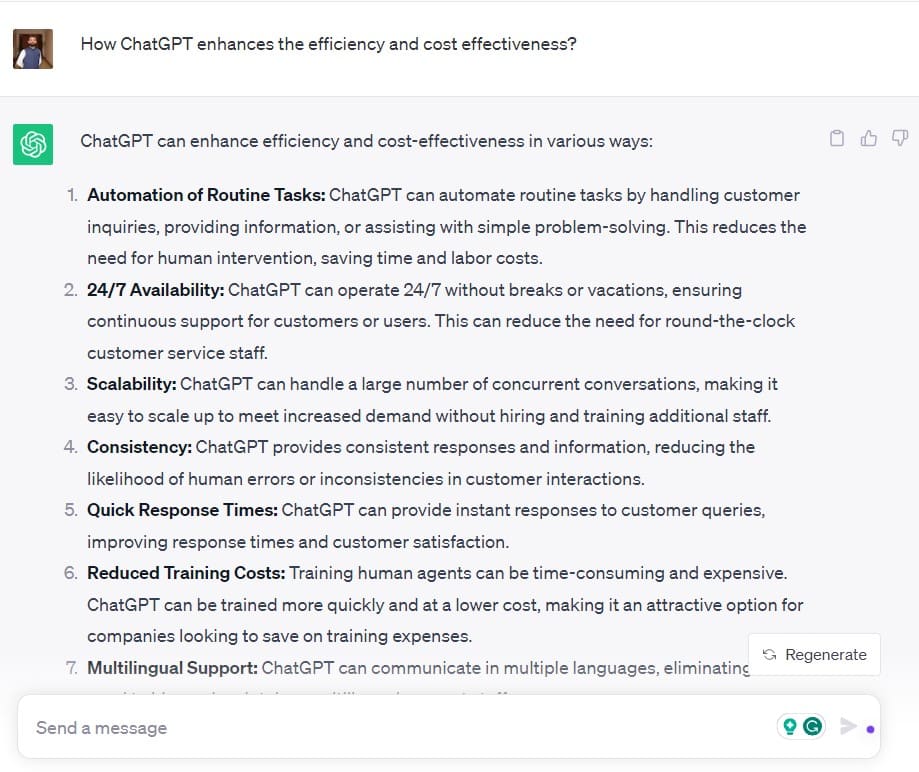
Customized Solutions and Personalized Interactions
One concern that some may have with using ChatGPT in consulting is the lack of personalized interactions that come with working with a human consultant. However, ChatGPT can be programmed to provide customized solutions to individual clients based on their specific needs and preferences.
Moreover, ChatGPT can be designed to mimic human-like interactions, such as using humor, empathy, and active listening to establish rapport with clients.
Reduced Bias and Improved Objectivity
Human consultants are susceptible to biases and subjective opinions impacting the consulting process and recommendations.
On the other hand, ChatGPT can provide an objective and data-driven approach to consulting that minimizes the impact of personal biases. Furthermore, ChatGPT can be programmed to provide diverse perspectives and insights, promoting inclusivity and fairness in the consulting process.
Limitations and Challenges
Despite the potential benefits of using ChatGPT in consulting, some limitations and challenges must be considered. For instance, ChatGPT may struggle to understand the nuances and complexities of certain industries or businesses requiring specialized knowledge and expertise.
Additionally, ChatGPT may not be able to provide the level of emotional support and human connection that some clients may require.
In short, ChatGPT has the potential to revolutionize the consulting industry by providing enhanced efficiency, customized solutions, improved objectivity, and reduced biases.
However, it is important to recognize that ChatGPT is not a complete replacement for human consultants and that it has some limitations and challenges that must be addressed.
The future of consulting will likely involve a balance between AI technology and human expertise, with ChatGPT playing a complementary role in the consulting process. Let’s look at how ChatGPT responds to challenges and limitations while assisting consultants:
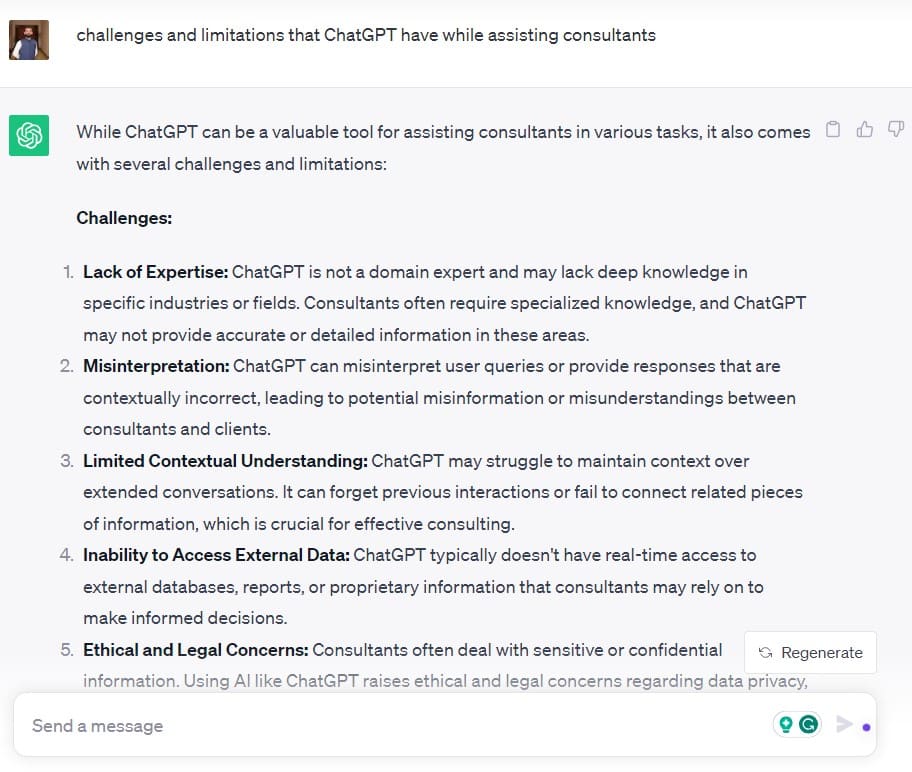
How Consultants Can Benefit From ChatGPT?
ChatGPT has the potential to revolutionize various industries, including consulting. While some may view ChatGPT as a potential threat to human consultants, the reality is that it can actually benefit consultants in many ways.
According to the International Council of Management Consulting Institutes, management consulting has a 27% likelihood of automation. Here are some examples of how ChatGPT can help consultants:
Enhanced Research and Knowledge Management
Consultants are expected to have a broad range of knowledge and expertise to assist their clients. However, it is impossible to know everything about every industry.
ChatGPT can enhance consultants’ research capabilities by providing instant access to vast amounts of information, data, and insights. By leveraging ChatGPT, consultants can quickly gather information and insights that can be used to provide value to their clients.
Improved Client Interactions and Communication
ChatGPT can be programmed to understand clients’ needs and preferences, enabling consultants to provide more personalized and effective communication. It can provide real-time feedback, prompt responses to clients’ inquiries, and even track and analyze clients’ interactions to improve future communications.
Using ChatGPT, consultants can enhance their ability to connect with clients and provide high-quality consulting services. Let’s see what ChatGPT tells about his interaction and communication with consultants:
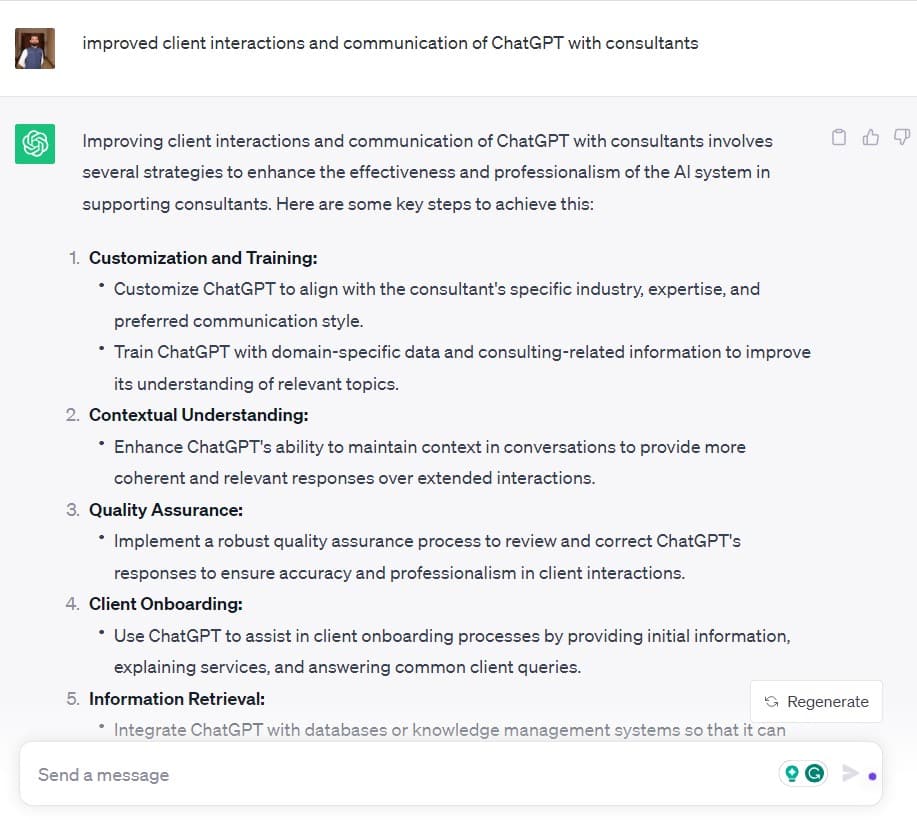
Streamlined Workflow and Increased Efficiency
ChatGPT can assist consultants with repetitive tasks, such as scheduling appointments, sending follow-up emails, and generating reports, thereby freeing up time for consultants to focus on more complex tasks that require their expertise.
By leveraging ChatGPT, consultants can streamline their workflow, reduce manual errors, and increase efficiency, resulting in higher productivity and better client outcomes.
Improved Decision-Making and Problem-Solving
Consultants are expected to provide expert advice and solutions to clients’ problems. ChatGPT can help consultants generate ideas, brainstorm solutions, and even simulate scenarios to determine the most effective approach.
The predictive capabilities and advanced analytics of ChatGPT help to provide data-driven insights and recommendations to their clients, improving their decision-making and problem-solving abilities.
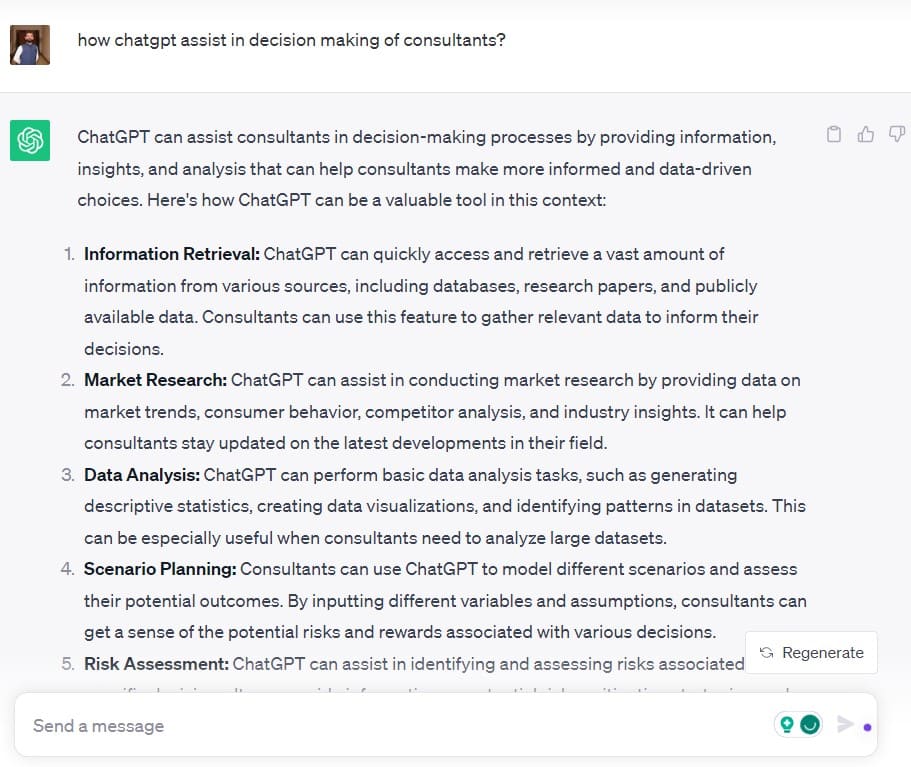
What Areas Will ChatGPT Replace Consultants?
ChatGPT has the potential to disrupt various industries, including consulting. While ChatGPT may not entirely replace human consultants, there are certain areas where it can outperform them. Here are some examples of areas where ChatGPT can replace human consultants:
Basic Information and Research
One area where ChatGPT can replace consultants is in providing basic information and research. ChatGPT can access vast amounts of information and data, analyze it, and provide insights, making it an excellent resource for basic research.
For example, if a client needs information on the latest trends in a particular industry, ChatGPT can provide them with real-time data and insights.
Data Analysis and Processing
ChatGPT can quickly process large amounts of data, providing insights that may not be immediately apparent to human consultants.
ChatGPT also assists consultants to save time and effort while providing clients with accurate and actionable insights. Let’s see what are the possibilities that the ChatGPT will outperform in data analysis and processing:
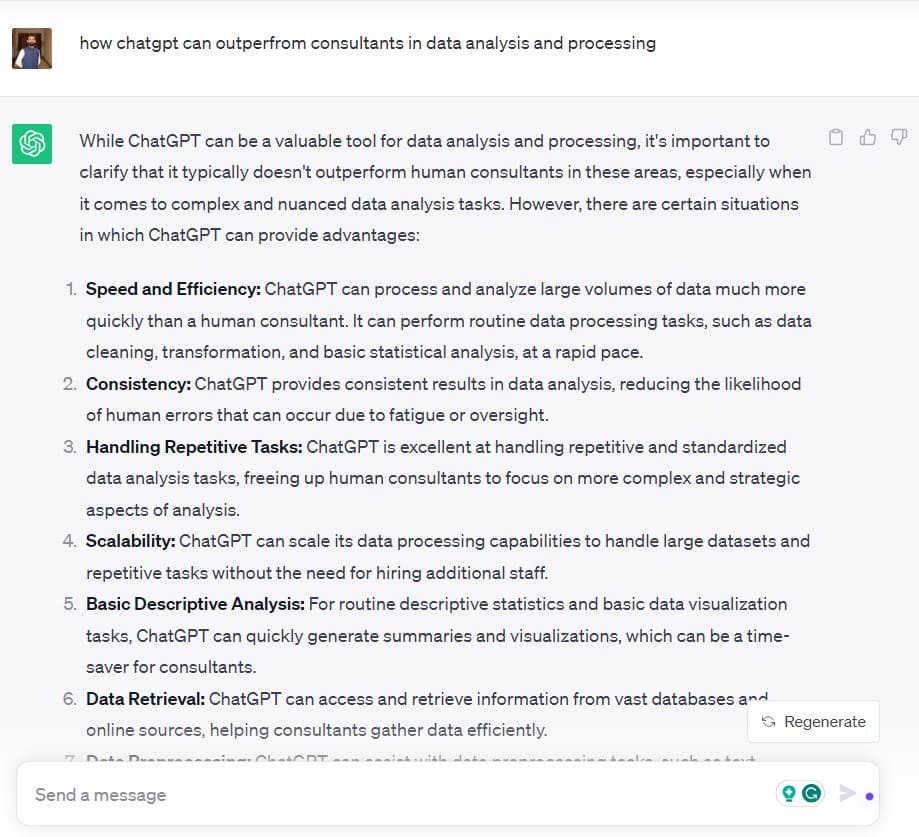
Routine Tasks
Consultants often have to perform repetitive and mundane tasks, such as scheduling meetings, sending emails, and generating reports. ChatGPT can automate many of these tasks, freeing up consultants’ time to focus on more complex and critical tasks.
By leveraging ChatGPT for routine tasks, consultants can improve their efficiency and productivity, providing more value to their clients.
Technical Support
In some cases, ChatGPT can replace consultants in providing technical support to clients. For example, if a client has a technical problem with a software program, ChatGPT can provide real-time assistance, troubleshoot the issue, and guide the client through the solution.
By using ChatGPT for technical support, consultants can save time and effort while providing clients with efficient and effective solutions.
Predictive Analytics
ChatGPT’s predictive analytics capabilities make it an excellent tool for predicting future trends and outcomes. By analyzing vast amounts of data and using machine learning algorithms, ChatGPT can make accurate predictions about various scenarios.
In some cases, ChatGPT’s predictive analytics capabilities may replace human consultants in providing insights and recommendations based on these predictions. Let’s see how the predictive analysis abilities of the ChatGPT outperform consultants:
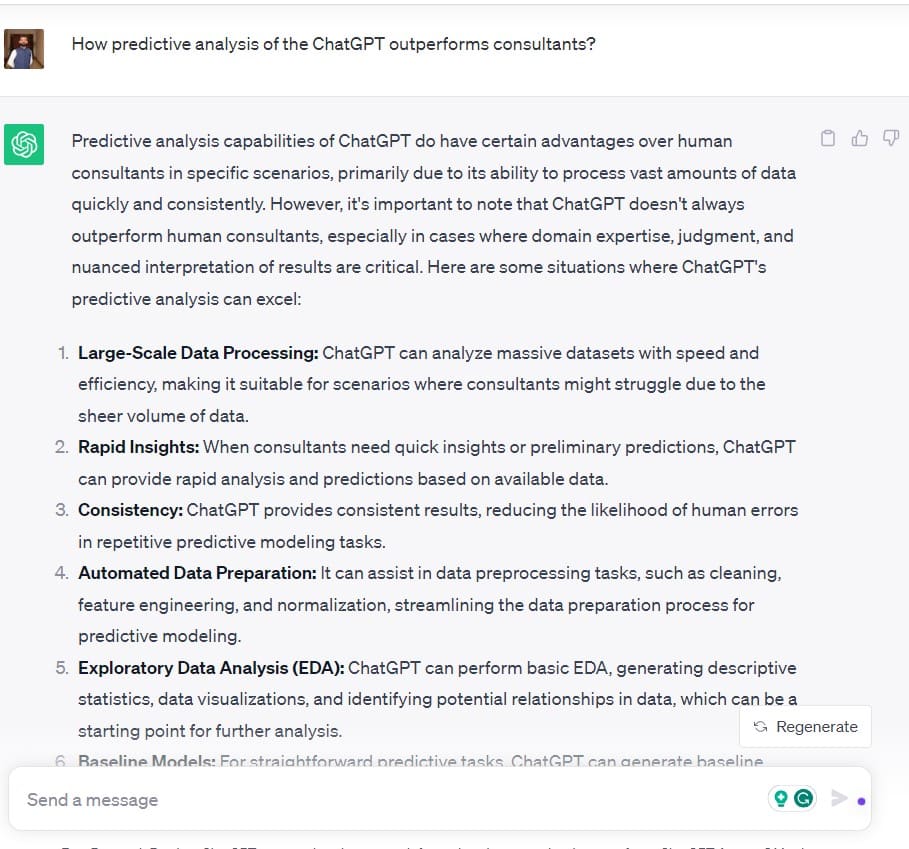
What Areas Will ChatGPT Struggle to Replace Consultants?
While ChatGPT can outperform human consultants in certain areas, there are certain areas where it may struggle to replace them. Here are some examples of areas where ChatGPT may struggle to replace human consultants:
Human Connection
Consulting is a people-centric industry that requires building trust, rapport, and relationships with clients. Human consultants can empathize with their clients, understand their needs, and provide customized solutions based on their specific requirements.
ChatGPT, on the other hand, lacks the emotional intelligence and human connection that human consultants can provide.
Creativity and Innovation
Consulting often involves identifying new opportunities, developing innovative solutions, and providing creative insights to clients. While ChatGPT can analyze data and provide insights, it lacks the creativity and innovation required to come up with unique and out-of-the-box solutions.
Human consultants can use their creativity and critical thinking skills to provide clients with solutions that ChatGPT may not be able to generate.
Let’s have a look at the creativity and innovation of the consultants that ChatGPT cannot overcome:
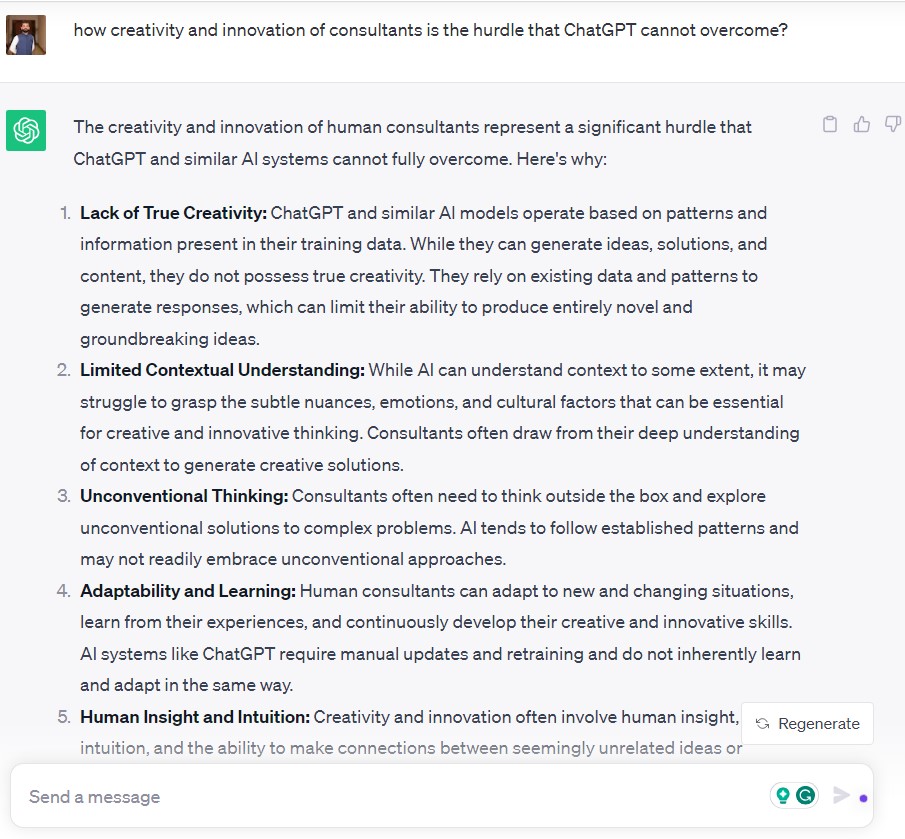
Ambiguity and Complexity
Consulting often involves dealing with ambiguous and complex problems that require a deep understanding of the context and nuances involved.
Consultants interpret and navigate complex situations, provide customized solutions, and adjust their approach based on the client’s needs. On the other hand, ChatGPT struggles to understand the context and nuances of a situation, leading to suboptimal solutions.
Subject Matter Expertise
Consulting often requires subject matter expertise in a specific area, such as finance, marketing, or technology. While ChatGPT can provide basic information and insights in these areas, it may lack the depth of expertise required to provide customized and specialized solutions.
Consultants leverage their subject matter expertise to provide clients with tailored and high-quality solutions. Let’s see how the subject expertise factor can be difficult for ChatGPT to replace:
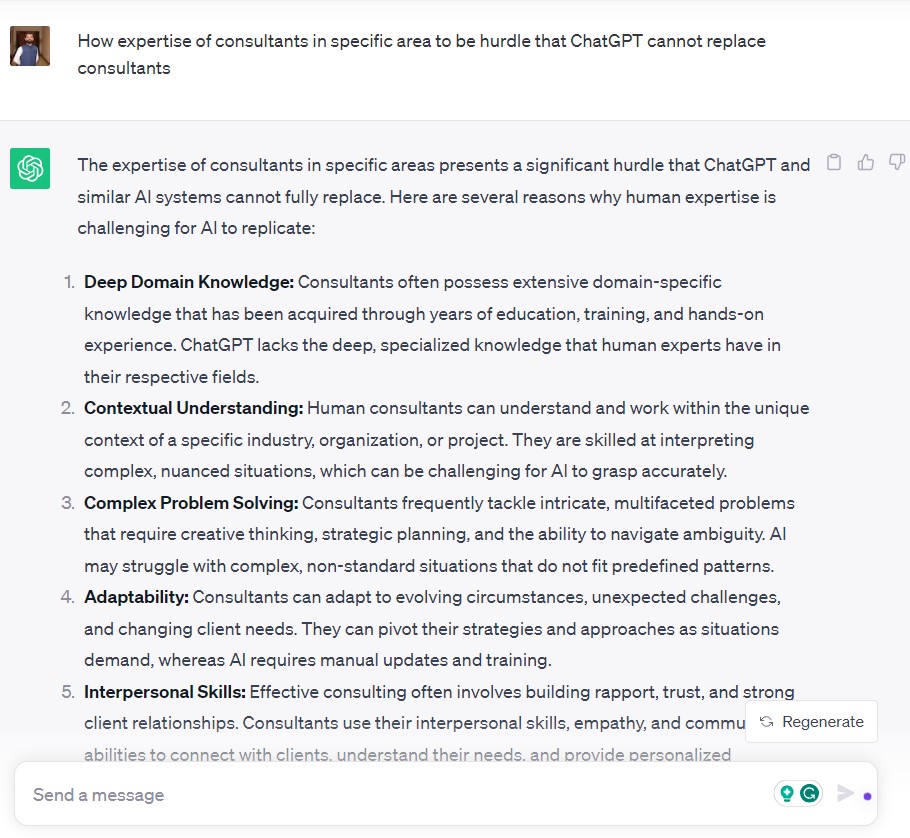
Ethics and Judgment
Consulting requires ethical and judgment-based decision-making, which may be challenging for ChatGPT to emulate. Human consultants can use their judgment to balance different interests and values, provide ethical guidance to clients, and navigate complex ethical dilemmas.
ChatGPT, on the other hand, may not have the ability to understand the ethical implications of its recommendations, leading to potentially harmful or unethical outcomes.
FAQs
How Will ChatGPT Impact Consulting?
ChatGPT has the potential to revolutionize the consulting industry by providing faster, more accurate, and cost-effective solutions to clients. It can analyze vast amounts of data and provide insights, automate repetitive tasks, and enhance the decision-making process.
Will ChatGPT Replace SAP Consultants?
While ChatGPT can provide basic information and insights on SAP, it may struggle to replace SAP consultants who have specialized expertise in SAP systems.
SAP consultants can provide customized solutions based on their in-depth knowledge and experience with SAP systems, which ChatGPT may not be able to replicate.
Will ChatGPT Replace Management Consulting?
ChatGPT can automate some of the tasks performed by management consultants, such as data analysis, market research, and trend analysis.
However, management consulting involves human connection, creativity, innovation, and judgment-based decision-making, which may be challenging for ChatGPT to replicate.
Will Consulting Be Replaced By Robots?
No, consulting will not be replaced by robots. Many consulting tasks involve collaboration and communication, which require a level of emotional intelligence and social skills that are not yet possible for robots to replicate.
Instead of replacing human consultants, technology like ChatGPT can augment their skills and abilities, providing real-time data and insights that enhance the decision-making process.
How Can ChatGPT Be Used in Consulting?
ChatGPT can be used in consulting to automate repetitive tasks, analyze vast amounts of data, and provide insights and recommendations.
It can also be used to augment human consultants by providing them with real-time data and insights, enhancing the decision-making process.
Can ChatGPT Replace Project Consultants?
While ChatGPT can automate some tasks performed by project consultants, like data analysis and progress tracking, project consulting involves human skills like communication, leadership, and relationship-building, which may be difficult for ChatGPT to do.
Additionally, project consulting often requires subject matter expertise, which human consultants can provide.